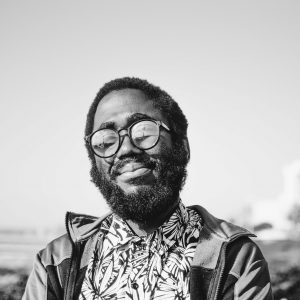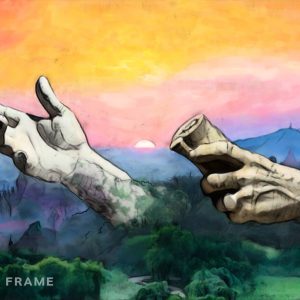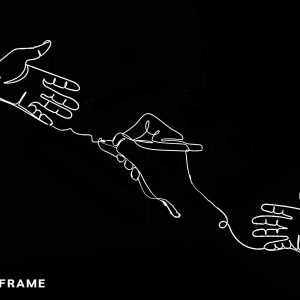A dean’s tale: The poems of Michael Weeder
The dean of St George’s Cathedral in Cape Town recently published two poetry collections that reflect on the Covid-19 lockdown, the personal, public and political, and identity and home.
Author:
24 June 2021

Growing up on weekly instalments of the adventures of Prince Valiant in the comics section of the Sunday Times newspaper eventually led me into the world of King Arthur and his Knights of the Round Table. The title of Dean of the Cathedral of St George the Martyr triggers memories of those excursions into medieval England. But we are in Cape Town and the dean is the African poet and priest, Michael Weeder.
The Very Reverend Michael Weeder is an accomplished raconteur who regularly shares his humour and thoughtful reflections with his followers on social media. He has now, in quick succession, published two collections of poetry: Lockdown, Love and Lament (2020) and The Promise of Memory (2021).
Related article:
“For me, poetry is a documentation of our lives. I have been inspired by Don Matera and also the very intimate poetry of Jeremy Cronin,” he says. After our conversation, I look up one of Cronin’s poems, Inside published by Raven Press, that I first discovered in the now partially destroyed Jagger Library of the University of Cape Town:
Faraway city, there
with salt in its stones,
under its windswept doek,
There in our Cape Town where
they’re smashing down homes
of the hungry, labouring people
— will you wait for me, my love?
In that most beautiful,
desolate city of my heart
where if staying on were passive
life wouldn’t be what it is.
Not least for those rebuilding
yet again their demolished homes
with bits of plastic, port jackson saplings,
anything to hand — unshakably
Defiant, frightened, broken,
and unbreakable are the people of our city.
— Will you wait for me, my love?
It is easy to see the similarities with Weeder’s poems. Both poets navigate the border between the public and the private, the personal and political. Weeder, more than Cronin, also operates in a country that has moved to political freedom but that has not quite shaken the shackles of socioeconomic inequality and psychological (and spiritual) oppression.
Acts of humanity
“Some of my favourite poems are in Lockdown, Love and Lament because it comes out of the focused period of the big lockdown,” Weeder says as he holds up the first of the two volumes. Lockdown, Love and Lament is based on his daily reflections during the Covid-19 pandemic in Cape Town. It is a record of the different phases of the lockdown that was imposed on South Africans during that period.
The national state of disaster, which President Cyril Ramaphosa declared with effect from 26 March 2020, led to the curtailment of many freedoms. Black South Africans have a history of having their freedoms restricted. Even today, neighbourhood watch groups in some of Cape Town’s southern suburbs – and others across the country – will alert its members to Black men walking in the area because of assumptions of who belongs there.
But for the first time in history, white South Africans had to contend with being denied some freedoms – by a majority Black government. The desire to congregate on beaches, surf in the ocean, smoke cigarettes, exercise in public and buy roast chicken became rallying points for many from the middle class who felt entitled to these activities. The irony was that some of the beaches that became sites of their protest were for decades closed to Black people in South Africa. Yet, the restrictions imposed by the South African government were not dissimilar from what was enforced in many other countries in the context of a global pandemic.

Amid all the rancour and anger at having to follow precautions to slow the spread of Covid-19, Weeder observed acts of basic humanity. It is the particular sight of one “grey SUV [that] arrives each day at the same time” from which a person, whose face he could not see, shares food with homeless people who sleep in the rough in a park opposite the deanery that speaks to the poem, Being.
I remember
your voice, kind
like your eyes
and I knew
that I was seen
and what you saw
made today, and the opening
of my eyes
to the nameless sky,
a prayer on its own.
Lockdown, Love and Lament contains poems that Weeder had written over the course of his life since the age of 16. But while they are not all new poems, the reflections that accompany each poem connect the past and present and point to the promise of new beginnings.
Personal, peculiar and particular
I know where me from.
I feel it in de bounce of de goema drum
tho I not know a place specifically
or me first given name genealogically.
But I know where me from
under stormy, dark sky or under de laughin’ sun.
The Promise of Memory delves into the personal journey of identity. “It comes out of the peculiar and particular way in which we are African,” he says. The first poem, I Know Where Me From, was inspired by an event in 1982 in London, on his first trip out of the country.
On a Friday evening, he is walking with a South African exile and a young Jamaican man, who refuses to acknowledge Weeder in the conversation. The South African exile “gently reprimands [the Jamaican man] about his chauvinistic views about blackness”.
Weeder’s views on identity resonate with the Caribbean experience. “When you are a Creole in Jamaica or Trinidad you are not up against other variations of yourself, whereas the Cape Creole is defined in relation to other Africans and then we are often having to prove how African we are. And I want to contest that. When I say I am Black, it is a political identity; when I say I am African, it is the way that I am African. Whether I don’t meet your criteria, that is your business. Because I am not European.”
Related article:
In the aftermath of the 1994 elections in the Western Cape, Weeder and others were in shock that so many people classified as coloured under apartheid chose to vote for the same political party that was responsible for a crime against humanity. This led to the formation of the December 1st Movement, for which Weeder was asked to write a discussion paper.
The December 1st Movement foundered soon after its first year of existence. This was mainly owing to the lack of mass support from the community categorised as coloured under apartheid, but also because of opposition among ANC leaders who feared it would promote “coloured” separatism, as scholar Mohamed Adhikari notes.
Weeder says ANC veteran Reg September apologised to him many years later, in 2005, for not having publicly supported the movement. It was September who told him about the influence the heritage of slavery had on the formation of early political opposition to colonialism and apartheid.
The first two days of December are important dates in the history of the Cape as they mark the abolition of slavery in 1834. Weeder was greatly influenced by Father Clive McBride (an unofficial chaplain to some adherents of the Black Consciousness Movement). McBride introduced him to the history of the National Liberation League and others who celebrated 2 December as a commemoration of the liberation of enslaved people at the Cape.
Related article:
In trying to understand more about the history of slavery, Weeder came across a footnote in Vivian Bickford-Smith’s chapter in Breaking the Chains, which mentioned Lydia Williams. Williams became the subject of his honours dissertation at the University of the Western Cape. For about four successive weekends, his wife and children would bundle into his car and drive with him from Lotus River to Maitland cemetery to search for Williams’ grave. He found it eventually.
Williams occupied the role of griot among her people. Like McBride, she marked an annual commemoration of the emancipation of enslaved people on 2 December. In her small cottage, she would host people, including others who were freed from slavery. One of her teaching tools was to show the scars on her back that remained from the beatings she received at the hands of those who had enslaved her. These stripes were earned mainly for the many times she ran away in her determination to be reunited with her child.
The trauma that enslaved people experienced manifests itself in the despondency of many of their descendants on the Cape Flats today.
“The Hebrew scriptures speak about the scapegoat who takes on all the sins of the tribe and is sent into the desert. A lot of our children are the scapegoats inheriting the trauma – conflict, forced removals. In our family it was Mark,” says Weeder.
Mark, my brother,
your beautiful, brown eyes
coloured by the pain of knowing
that the wards and doctors were
of the same prison, you knew
from another time.
Mark, a year younger than Michael, had a violent streak and spent time in Valkenberg Psychiatric Hospital. He died at the age of 55, after a heart attack and a stroke, his leg having been amputated because of diabetes.
Pilgrimage of an internationalist
Weeder reflects on the power of pilgrimage, something he says Christianity has lost out on. He visited the Holy Land with his wife in 2016. As a supporter of the Palestinian struggle, he faced criticism from some friends for this decision. When he placed his hand in the cavity where, according to tradition, the cross on which Jesus died was placed, he was overcome with a deep sadness.
His own journey covers much of the Cape Flats where he was born and grew up. But he is an internationalist. He loves Cuba and he spontaneously broke into song when talking about his visit to Cuba in a New Apostolic Church congregation. “My heart is in Havana. Havana, ooh na-na,” singing Camila Cabello’s pop song.
Related article:
He had the opportunity to visit Beirut in 1982, as a guest of the Near East Council of Churches. His poem, Something That is Loved is Never Lost, precedes his reflection on a nine-year-old girl, Mariam, who is reunited with her parents after a car-bomb explosion near her school. “My recall of that day,” he writes, “helped Bonita, my spouse, and me in our decision to have and to raise children in an apartheid South Africa.”
In that same year, as a young man in New York, he tracked down Abdullah Ibrahim and arranged to meet him so he could hand him a poem he had written for the iconic jazz musician. He ended up spending the day with Ibrahim and met his now late wife, artist Sathima Bea Benjamin. The poem that he dedicated to Ibrahim does not make it into either of his two collections, but reflections on Benjamin do. Weeder writes in Sathima Sang:
Africa of birdsong
heard in the shade of trees
along which the Camissa flowed
an adagio tempoed sigh of home.
Africa.
The Promise of Memory is available in Cape Town at The Book Lounge in Roeland Street and Exclusive Books Cape Town International Airport, Domestic Departures; and in Johannesburg at Bridge Books in Commissioner Street and Exclusive Books Sandton City. Orders can be placed online through www.africanbookscollective.com and Amazon.com. Lockdown, Love and Lament is available directly from Michael Weeder.




